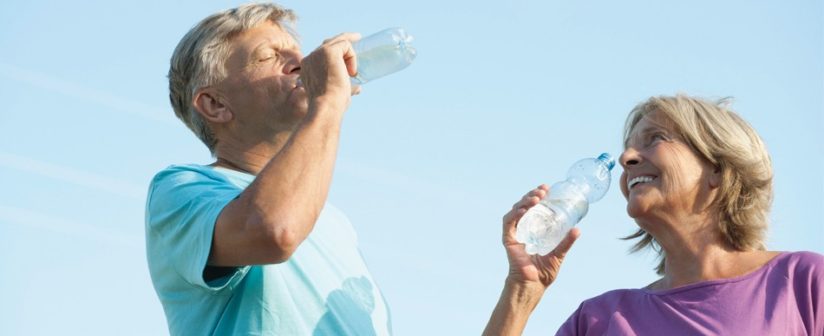Hydration is an important aspect of nutrition for everyone, and it is key in maintaining good health and overall well being.Your body depends on water to survive. Every cell, tissue, and organ in your body needs water to work properly. For example, your body uses water to maintain its temperature, remove waste, and lubricate your joints. Water is needed for overall good health.Monitor how much water you drink each day but also pay attention to your body for signs of dehydration, such as dark urine color and headaches. Simple physical tests can quickly and easily be performed at home, too, to identify your general hydration status.
How much should a person drink a day to remain hydrated?
What does being well hydrated mean? The amount of water a person needs depends on climatic conditions, clothing worn and exercise intensity and duration.
A person who perspires heavily will need to drink more than someone who doesn’t. Certain medical conditions, such as diabetes or heart disease, may also mean you need to drink more water. People with cystic fibrosis have high concentrations of sodium in their sweat and also need to use caution to avoid dehydration. And some medications can act as diuretics, causing the body to lose more fluid.Thirst isn’t the best indicator that you need to drink.However, the best indicator of your hydration status is the color of your urine. For most healthy adults, clear or pale-colored urine suggests adequate hydration, whereas a dark yellow or amber color usually signals dehydration. To make sure you are drinking adequate water throughout the day, make it a habit to drink a glass of water when you first get up in the morning, carry a reusable water bottle with you throughout the day and drink a glass of water with each meal.
Water is best for staying hydrated. Other drinks and foods can help you stay hydrated. However, some may add extra calories from sugar to your diet. Fruit and vegetable juices, milk, and herbal teas add to the amount of water you get each day. Even caffeinated drinks (for example, coffee, tea, and soda) can contribute to your daily water intake. A moderate amount of caffeine (200 to 300 milligrams) is not harmful for most people. This is about the amount in 2 to 4, 8-ounce cups of coffee. However, it’s best to limit caffeinated drinks. Caffeine may cause some people to urinate more frequently, or feel anxious or jittery.
If staying hydrated is difficult for you, here are some tips that can help:
- Keep a bottle of water with you during the day. To reduce your costs, carry a reusable water bottle and fill it with tap water.
- If you don’t like the taste of plain water, try adding a slice of lemon or lime to your drink.
- Drink water before, during, and after a workout.
- When you’re feeling hungry, drink water. Thirst is often confused with hunger. True hunger will not be satisfied by drinking water. Drinking water may also contribute to a healthy weight-loss plan. Some research suggests that drinking water can help you feel full.
- If you have trouble remembering to drink water, drink on a schedule. For example, drink water when you wake up, at breakfast, lunch, and dinner, and when you go to bed. Or, drink a small glass of water at the beginning of each hour.
- Drink water when you go to a restaurant. It will keep you hydrated, and it’s free.
Recognizing signs of dehydration is important. They include:
- Little or no urine.
- Urine that is darker than usual.
- Dry mouth.
- Sleepiness or fatigue.
- Extreme thirst.
- Headache
- Confusion
- Dizziness or lightheadedness.
- No tears when crying.
Water makes up more than half of your body weight. You lose water each day when you go to the bathroom, sweat, and even when you breathe. You lose water even faster when the weather is really hot, when you are physically active, or if you have a fever. Vomiting and diarrhea can also lead to rapid water loss. If you don’t replace the water you lose, you can become dehydrated.
Don’t wait until you notice symptoms of dehydration to take action. Actively prevent dehydration by drinking plenty of water.
Sources:
http://www.livestrong.com/article/438381-how-can-i-tell-when-my-body-is-hydrated
https://familydoctor.org/hydration-why-its-so-important


